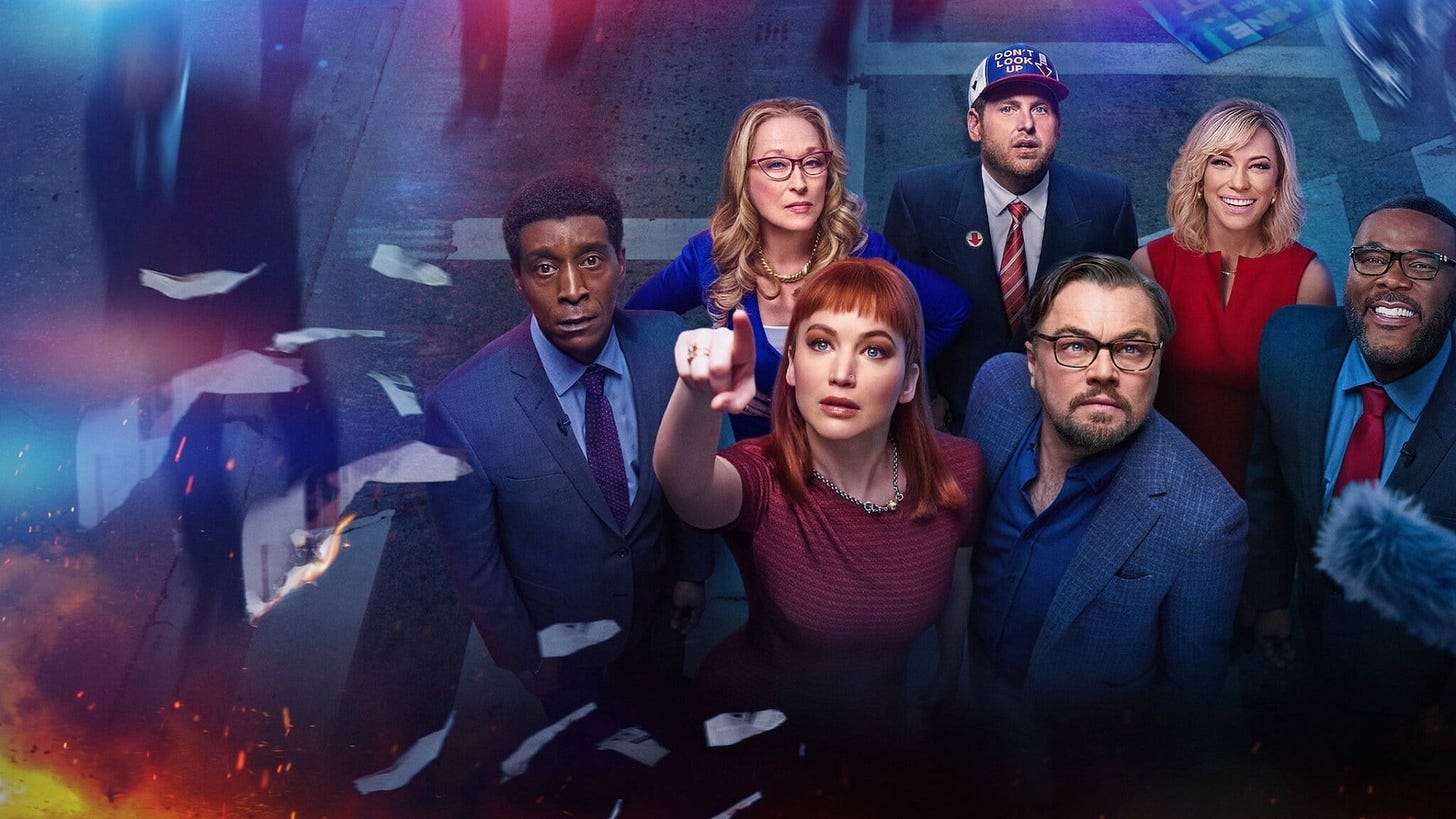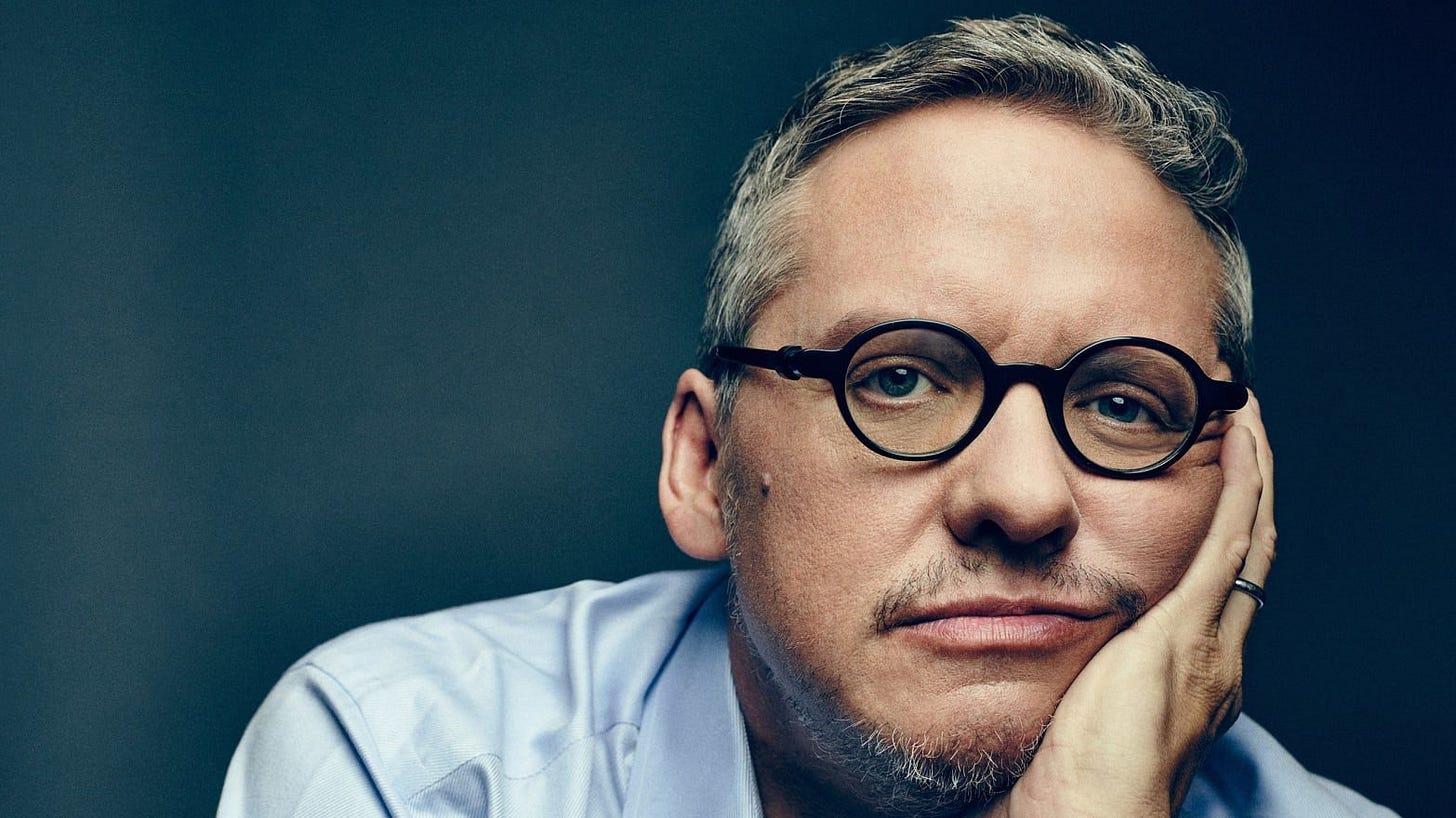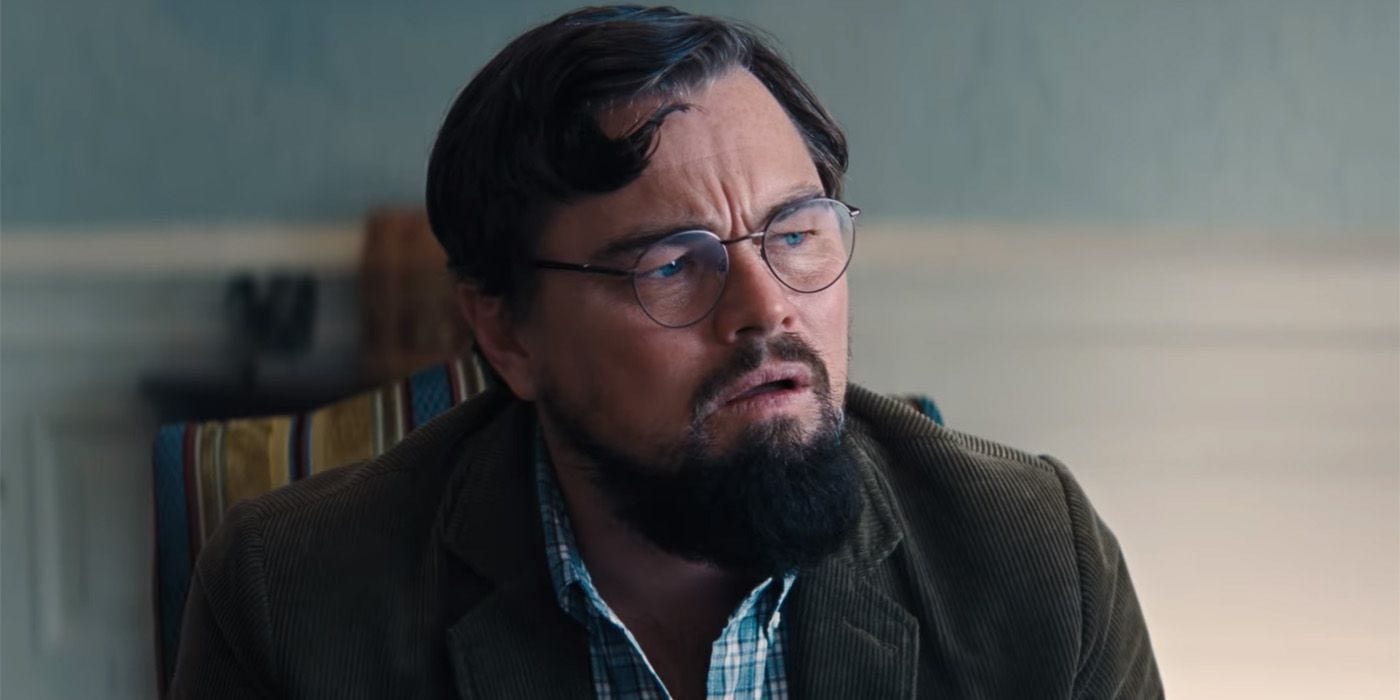Writer/director Adam McKay struck gold with The Big Short in 2015. A jazzy, boisterous film, the picture used a grab-bag of styles and devices to tell the story of the financial crash of 2008. Working from the book by Michael Lewis, McKay built the structure from several narrative threads. He moved seamlessly between Michael Burry (Christian Bale)—a hedge fund manager who spent years predicting that America’s housing bubble would burst—and Mark Baum (Steve Carrel), a disgruntled investor working under the aegis of Morgan Stanley who becomes convinced of Burry’s theory when nobody would give him the time of day. McKay got his actors into a jocular mood, letting them mix comedy and drama in a free-flowing, improvisatory manner. In between, he threw in direct addresses to the audience from spokesmen like Anthony Bourdain and Margot Robbie, turning otherwise mind-numbing economics lessons into gags and riffs. Overlaying the fun, though, was a sense of righteous indignation about the Wall St. fat cats whose recklessness destroyed millions. His follow-up picture, Vice, was a self-serious affair, and while it enraged me, I was reacting more to the actual crimes of Dick Cheney than the quality of the movie.
McKay’s latest feature, Don’t Look Up, is not on the same level as The Big Short. It’s a less ambitious picture, and it lacks the bravado that made the other film such a ballsy achievement. It’s not as sophisticated in writing or style. But it’s a lot of fun. McKay again elicits loose-limbed performances from his actors, almost all of whom locate an alchemy of comic precision and dramatic delivery. And he holds up a mirror to the cultural and political polarization of the times. The story is a fictitious one in which two no-name scientists in Michigan, Randall Mindy (Leonardo DiCaprio) and Kate Dibiasky (Jennifer Lawrence) discover a comet on a direct collision course with Earth. After frantically running through the calculations, they conclude that humanity has six months before impact—a direct hit that will wipe out all life.
When Mindy and Dibiasky try to share their findings with the government, they meet with breathtaking incompetence. President Orlean (Meryll Streep), operating under the influence of her crass son and Chief of Staff Jason (Jonah Hill) downplays the threat. The scientists take to the airwaves to alert the public, but morning show co-hosts Jack Bremmer and Brie Evantee (Tyler Perry and Cate Blanchett) are ditzy and impervious to reality. Dibiasky loses her shit on air, while Mindy becomes a kind of geek sex symbol. Things change, however, when Orlean hits a political snag—her Supreme Court nominee is torpedoed by a sex scandal, and the President runs back to the scientists with a plan to blow the comet off course and boost her polls. Just as the nukes get launched, however, the mission’s aborted: mogul Peter Isherwell (Mark Rylance, channeling Steve Jobs) learns that the comet contains valuable minerals that can be used to grease the wheels of capitalism. He convinces Orlean to mount a new mission through his company, BASH, that will fracture the crag into harmless fragments, allowing him to extract the resources for profit. Desperate and horrified, Mindy and Dibiasky race against time and the government to beat BASH and avert extinction.
It’s easy to see this movie as an allegory of the climate catastrophe, and that reading’s certainly valid. But it’s also a pandemic picture, an image of the world riven by feuds over a natural threat to the species, the credibility of science, and the failures of government. As the Orlean administration pivots to back Isherwell, they cultivate a culture of denial among the populace, a carnival of ignorance. McKay deploys social media imagery and depicts populist performances that evoke the rallies of Trump, January 6th, and anti-maskers. Meanwhile, Mindy and Dibiasky mount a counter-campaign, with pop concerts and the slogan “Just Look Up!” fueling their followers (Ariana Grande gets in on the act as a version of herself).
Critics of McKay complain that he condescends toward right-wingers, another coastal elite mocking the honest views of millions. Yes, the movie draws crude plot lines and simplistic characters. David Sirota’s screenplay is rather juvenile in its leftist world-view. But this is a satire, for God’s sake, in the vein of Dr. Strangelove. Was Chaplin wrong to send up fascists, or Orwell to ridicule communists? A director’s allowed to make fun and caricature people in his fictive world. It’s not McKay’s fault that during COVID thousands have swallowed conspiracy theories like so much hydroxychloroquine. What’s he supposed to do, enable their delusion? And he’s mocking the entire establishment, really—the Orlean administration could just as easily be Democrats enthralled by Big Tech. By denouncing McKay, conservatives are playing right into his hands, even as they take to the airwaves and podcasts to own the libs themselves.
Moreover, McKay doesn’t lionize his heroes. Mindy strikes up a reckless affair with Evantee, abandoning his family to cash in on fame. Dibiasky has no tact and all but gives up on saving humanity, her cynicism rewarded by the stupidity of her fellow earthlings. There’s a hard-boiled, world-weariness to these characters. They’re good at their job, but uncomfortable selling themselves. Both have to grow into their roles, and their journeys keep you anchored throughout the insanity. DiCaprio and Lawrence are both very fine here. Leo muffles his charisma, trading in the cock-of-the-walk bullishness of Jordan Belfort for a dad bod and demeanor. He feels physically discomfited and gives Mindy’s anxiety disorder an endearing quality. There’s an intelligence to his nervous performance; the actor channels multiple emotions at once, such as when he, too, explodes on air.
DiCaprio’s a hothouse actor, which can lead to disaster when the material or direction’s against him—think Gangs of New York, Inception, and J. Edgar. But McKay draws him into a relaxed state that turns comic at the end; it’s as if DiCaprio’s got nothing to prove and glides naturally into the skin of this naive, nice midwesterner. You’ve got to hand it to the guy. He’s escaped the trappings that came with early fame and recovered from peak follies like The Great Gatsby and Shutter Island. While other stars slack off, he’s set a frenetic pace as a producer and actor. His interests are wide-ranging, from history (he was behind documentaries about both Teddy Roosevelt and Ulysses Grant) to the environment. He obviously brought the latter to bear on his role as Mindy. I think this performance, unflashy as it may be, is up there with his best. He’s set to play TR in the Scorcese biopic next year and I can’t wait.
But Don’t Look Up is an ensemble picture, and almost everyone’s firing on all cylinders. They take mediocre material and make it zing. Lawrence gives finely calibrated deliveries to her lines, exuding the depressive state of Dibiasky, who bears the unfortunate honor of having the comet named after her. She and Hill have some punchy exchanges in the Oval Office, like boxers going rapid-fire. Much of the comedy is spontaneous, and I don’t know how anyone keeps a straight face around Hill. After proving himself a real actor in a number of parts, he’s back to the bludgeoning insults of his Judd Apatow days. I, for one, found it uproarious. Streep’s vanity serves her well as a vapid, brainless politician. And she has a tremendous line reading when she realizes that she’s forgotten her son while evacuating on a spaceship.
As the seductive, haughty Evantee, Cate Blanchett is unbelievable. Is there anything this woman can’t do? She transforms herself yet again, what with her chameleon quality, and it took me a minute to realize she was behind that brittle smile. She captures the hollowness of a cable anchor, and her line readings are extraordinary—she does wonders with otherwise banal dialogue. Evantee’s a character out of high comedy, and her fling with Mindy allows for some vicarious pleasure. Perry’s breezy fun as her co-anchor, and Rob Morgan lends a necessary seriousness to his part as Ted Oglethorpe, a government official who champions the scientists.
The only one who seems off is Rylance, which is strange to write. After decades conquering Shakespeare, he’s broken into the movies in recent years. To my chagrin, I missed his theater career, so I can only go by what I see onscreen. So far, I’m still waiting for the mesmerizing actor I’ve heard about. He made a point to underplay his role on the T.V. show Wolf Hall and in films like Bridge of Spies. Even his turn as the lawyer William Kunstler in Aaron Sorkin’s The Trial of the Chicago 7 came off as flat. I didn’t mind it, especially in a movie as rousing as Sorkin’s. But compared with the dynamism of Eddie Redmayne, Joseph Gordon-Levitt, Sacha Baron Cohen, Michael Keaton, Yahya Abdul-Mateen III, and Frank Langella—you know, the entire rest of the cast—Rylance seemed small. I’m not sure if his approach in Don’t Look Up is meant to compensate, but if so, it misfires. He comes off as a robot, giving Isherwell a squeaky voice and autistic affect. The makeup’s layered on thick and the wig doesn’t look good. He goes too far in his depiction; the rest of the cast walk the line between plausibility and buffoonery. For satire to work, you have to keep one foot grounded in realism. Rylance strays into camp.
It’s revealing to compare this film with previous disaster movies. Armageddon and Deep Impact came out in 1998, each predicated on a rock striking Earth. They differ in ending—Bruce Willis’s character destroys the asteroid in Michael Bay’s explosion-riddled blockbuster, but humanity only breaks apart the comet in Mimi Leder’s, leading to massive (if partial) destruction. But they share a basic optimism about technology and international cooperation, capturing the exuberance of the late ‘90s. Government performs admirably in both movies, the scientists trusted, the populations united behind the missions. A quarter of a century later, our political climate couldn’t feel more different. Like those others, McKay’s film channels the current zeitgeist, with its pessimism about the global regime's ability to reverse global warming or for citizens to agree on the basic facts of just about anything. The cartoonish style of Don’t Look Up serves this point—as an audience, we’re not overawed by the effects, just as the characters aren’t impressed by the government response. This picture’s not the stuff of giants, but its gallows humor is a tonic for our times.
And there’s a moral core at its heart, too. After being banned from official functions for insubordination, Dibiasky washes up as a clerk at a grocery store. There she strikes up an end-times romance with a skateboarder named Yule (Timothée Chalamet). Chalamet injects a hilarious punk-bro energy into his appearance, but there’s more than meets the eye. While gazing at the comet one night, he confesses to the older woman that he’s a Christian, carrying on the faith of his parents (“Even though I hate them!” he quickly makes clear). Dibiasky finds this precious and agrees to marry the kid when he blurts out a proposal in a car.
Call me old fashioned, but I appreciated this positive yet fun portrayal of a believer in Jesus. McKay’s detractors should give him credit. While sending up the culture war’s perversions, he celebrates a faithful soul in the end—and an evangelical at that. Yule’s not particularly pious, just looking for kicks with his friends. But when he joins Dibiasky, Mindy, and the latter’s family for a last supper before impact, McKay puts a prayer in his mouth that truly moved me. You don’t often find such a spiritual expression in a movie, certainly not a satire. But Chalamet’s delivery surprises and convicts you, channeling a spirit of gratitude, regret, and acceptance that hits home amidst the apocalyptic hedonism. Would that we’d all follow suit.










What is a hothouse actor? New expression for me. I agree with most of what you say. I think each actor captured their character. The depiction of our fractured society and all the ways that people respond. I loved the ending think DiCaprio was so real when he said we had it all didn’t we. And just the love and wonderment and sadness of being with family. As many of us learn we take so much for granted. Keep em coming.